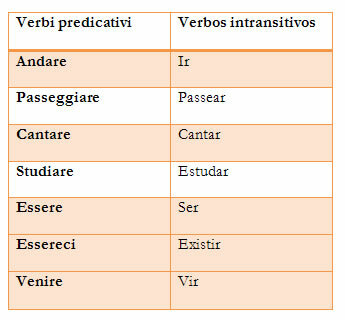Meaning: / Meaning: * “Part of the phrase that cotitusce with the dice of the soggetto.” / ‘Part of the sentence that constitutes what is said about the subject.’
*Definition taken from the Dizionario Garzanti di Italiano.
Secondo Dardano & Trifone, alla “Italian Grammatica con nozioni di linguistica”, the definition of Question element of the sentence può darsi: “il predicato is ciò che detto apropos del soggetto”. Osserva che in ambedue defines (dictionary and grammatical) the sense and the stesso, tearing così less complete its comprehension. / According to Dardano & Trifone, in “Grammatica Italiana con nozioni di linguistica”, the definition of this element of the sentence can be: 'the predicate is what was said about the subject'. Note that in both definitions (dictionary and grammar) the meaning is the same, thus making its understanding less complicated.
Così eat the soggetto, the predicate is considered a necessary element of the sentence. Lui will always format the verb or the un insieme verbale. Vedrai al testo eats distinguish and eats capirlo.
All the Italian language, the predicato può that is divided into 2 gruppi, a livello di comprensione: / In Italian, the predicate can be divided into 2 groups, for better understanding:
• Quelli che sono verbali, and / Those who are verbal, and
• Quelli che sono nominali. / Those that are nominal.
 Predicate verbale: cos’è? / Verbal predicate: what is it?
Predicate verbale: cos’è? / Verbal predicate: what is it?
If you know this predicate, if it is a verbal chiama, it is the format of a predicative verb, ciò vuole direct, it is a gift for the sense autonomous and combined, così squeezing a stato oppure a condizione del soggetto and si può anche to use it from the ground in una phrase. If you have to go directly to the verbal predicament, always agree with the col soggetto in persona and number. Vedi la tabella e gli esempi / It is known that this predicate is called verbal because it is formed by an intransitive verb; that is to say, it has an autonomous and complete sense, thus expressing a state or condition of the subject and it can also be used alone in a sentence. It must also be said that the verbal predicate always agrees with the subject in person and number. See table and examples.

Vedi le frasi: / See the sentences:
1) Giulia joins. / Giulia comes now.
2) Giuseppe sings tutte le mattine. / Giuseppe sings every morning.
3) Oggi studio. / Today I study.
4) Giulia ha cominciato a ballare./ Giulia started dancing.
5) Io sleep. / I'm.
6) Giuliana ha passeggiato. / Giuliana walked around.
7) Dio c’è. / God exists.
Pay attention! / Watch! When the verb essere has the meaning of: esistere, vivere, stare, rimanere, trovarsi, the predicate always sarà detto verbale. / When the verb 'essere' has the meaning of: exist, live, be, remain, meet, the predicate will always be said to be verbal.
When the verb essere has the meaning of: esistere, vivere, stare, rimanere, trovarsi, the predicate always sarà detto verbale. / When the verb 'essere' has the meaning of: exist, live, be, remain, meet, the predicate will always be said to be verbal. When i verbi sono alla passive form, it should be considered predicati verbali, giacché il verb ‘essere’ ha funzione di ausiliare. / When verbs are in the passive form, they must be considered as verbal predicates, since the verb ‘essere’ has an auxiliary function.
When i verbi sono alla passive form, it should be considered predicati verbali, giacché il verb ‘essere’ ha funzione di ausiliare. / When verbs are in the passive form, they must be considered as verbal predicates, since the verb ‘essere’ has an auxiliary function. When we use i verbi servili and i verbi phraseologici come ‘cominciare a’, ‘stare per’ ecc, il predicato is anche considerato verbale. / When we use servis verbs and phraseological verbs like ‘cominciare a’, ‘stare per’ etc., the predicate is also considered to be verbal.
When we use i verbi servili and i verbi phraseologici come ‘cominciare a’, ‘stare per’ ecc, il predicato is anche considerato verbale. / When we use servis verbs and phraseological verbs like ‘cominciare a’, ‘stare per’ etc., the predicate is also considered to be verbal.
|
Puntata! / Tip! I have seen the testi che you can use this as: “Soggetto: cos’è?”, “Soggetto grammaticale, Soggetto logico, Soggetto sottinteso: cosa sono?”, “The difference between phrase and proposition”. / Check the website for texts that may be useful to you, such as: “Soggetto: cos’è?”, “Soggetto grammaticale, Soggetto logico, Soggetto sottinteso: cosa sono?”, “La differenza tra phrase e proposizione”. |
Isabela Reis de Paula
Brazil School Collaborator
Graduated in Languages with Qualification in Portuguese and Italian
By the Federal University of Rio de Janeiro - UFRJ
Source: Brazil School - https://brasilescola.uol.com.br/italiano/predicato-cose-predicado-que-e.htm

